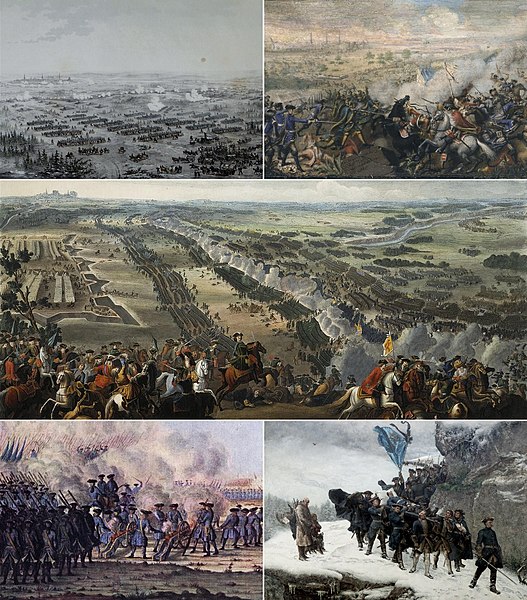The Battle of Poltava was the decisive and largest battle of the Great Northern War. A Russian army under the command of Tsar Peter I defeated a Swedish army, under the command of Carl Gustaf Rehnskiöld. The battle put an end to the status of the Swedish Empire as a European great power, as well as its eastbound expansion, and marked the beginning of Russian influence in Northern Europe.
Engraving of the Battle of Poltava
The victory at Poltava by Alexander Kotzebue.
The Great Northern War (1700–1721) was a conflict in which a coalition led by the Tsardom of Russia successfully contested the supremacy of the Swedish Empire in Northern, Central and Eastern Europe. The initial leaders of the anti-Swedish alliance were Peter I of Russia, Frederick IV of Denmark–Norway and Augustus II the Strong of Saxony–Poland–Lithuania. Frederick IV and Augustus II were defeated by Sweden, under Charles XII, and forced out of the alliance in 1700 and 1706 respectively, but rejoined it in 1709 after the defeat of Charles XII at the Battle of Poltava. George I of Great Britain and the Electorate of Hanover joined the coalition in 1714 for Hanover and in 1717 for Britain, and Frederick William I of Brandenburg-Prussia joined it in 1715.
From left to right: Battle of Narva (1700) Charles XII crossing the Düna (1701) Peter I at the Battle of Poltava (1709) Battle of Gadebusch (1712) Bringing Home the Body of King Charles XII (1718)
The bombardment of Copenhagen, 1700
Battle of Riga, the first major battle of the Swedish invasion of Poland, 1701
Battle of Gangut (Hanko)






